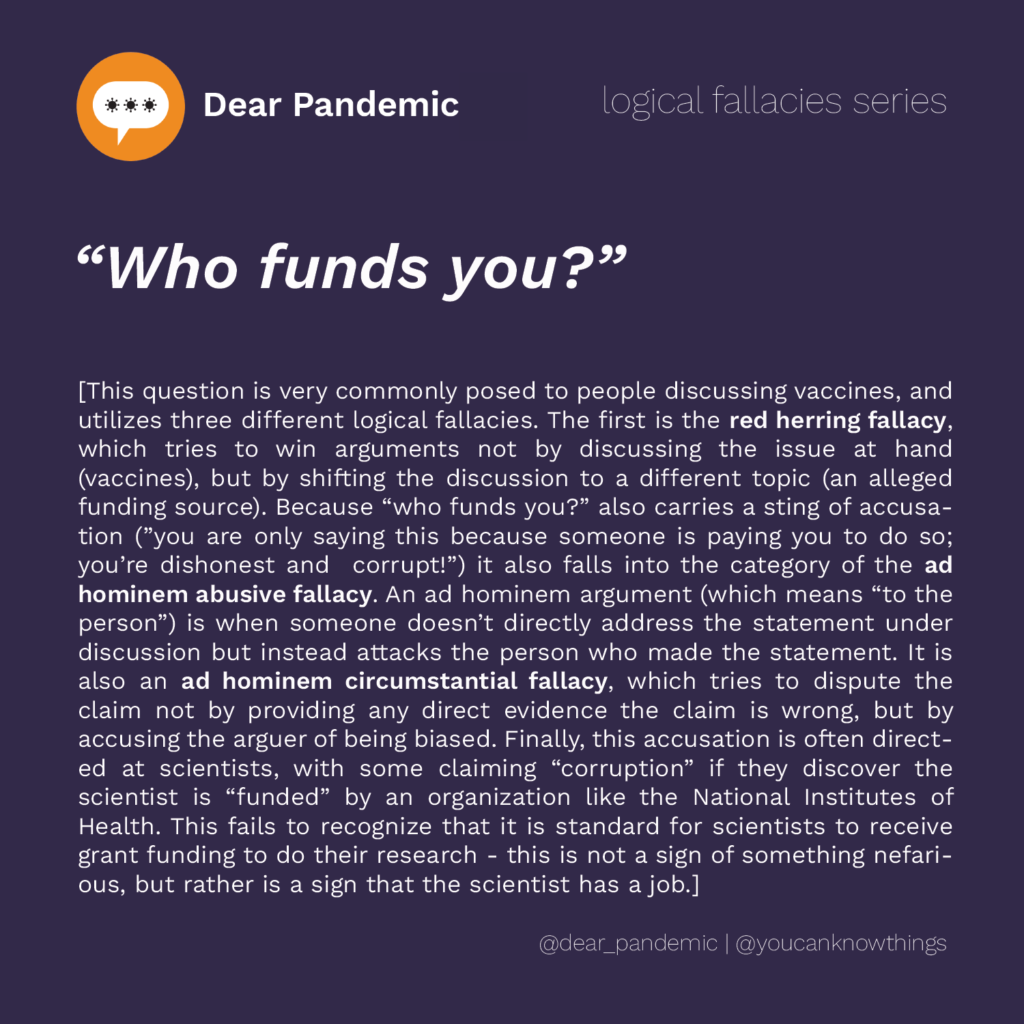At Dear Pandemic, we want to dish out science facts AND equip our readers with tools to make sense of data and science themselves.
This is post is part of an ongoing series by Dr. Kristen Panthagani of You Can Know Things, in which she dissects common logical fallacies that have led people astray during the pandemic.
“Who funds you?”
“Who funds you?” is very commonly posed to people discussing vaccines and utilizes three different logical fallacies. The first is the red herring fallacy, which tries to win arguments not by discussing the issue at hand (vaccines), but by shifting the discussion to a different topic (an alleged funding source). A red herring fallacy occurs anytime someone intentionally or unintentionally brings up a topic that is only tangentially related to the topic at hand and serves as a distraction that provides no useful information.
Because “who funds you?” also carries a sting of accusation (”you’re dishonest and corrupt!”) it also falls into the category of the ad hominem abusive fallacy. An ad hominem argument (which means “to the person”) is when someone doesn’t directly address the topic under discussion (i.e. ‘how well do the COVID vaccines work?’) but instead attacks something about the person who made the statement. In the abusive form of this fallacy, the character of the person is attacked in attempt to try to discredit them.
“Who funds you?” also falls under a second type of ad hominem fallacy: the ad hominem circumstantial fallacy. This type of ad hominem fallacy tries to dispute the claim not by providing any direct evidence the claim is wrong, but by arguing that a person’s circumstances are biasing their judgement, therefore their claims must be false. While it is important to consider conflicts of interests and biases, accusing someone of bias is not a logically valid rebuttal to an argument about data. If they truly are biased and that bias is influencing their interpretation of the data, then a logically valid rebuttal would point out why the data interpretation is wrong, not simply attack them with accusations of bias. Finally, this accusation is often directed at scientists, with some claiming “corruption” if they discover the scientist is “funded” by an organization like the National Institutes of Health. This fails to recognize that it is standard for scientists to receive grant funding to do their research – this is not a sign of something nefarious, but rather is a sign that the scientist has a job.
A note on logical fallacies:
Logical fallacies are common patterns of reasoning that seem true on the surface but have one or more critical flaws. At their root, many are oversimplifications–like a cognitive shortcut. They are appealing because they make something complex, like vaccine safety or the efficacy of masks, into something simple and easy to understand. However, this oversimplification often leaves out important details, leading to the wrong conclusions.
Logical fallacies are common and used by people arguing both for and against nearly every pandemic topic. They are NOT a sign of stupidity or lack of intelligence: they have tripped up nearly everyone at some point. And just because someone uses a fallacy in their argument doesn’t automatically mean they’re wrong — (that’s the fallacy fallacy!). It simply means they haven’t provided adequate evidence supporting their argument, but that evidence may in fact exist. It’s useful to recognize logical fallacies in our own thinking so we can make more accurate conclusions about the world around us.

More in this series:
The Appeal to Authority Fallacy


